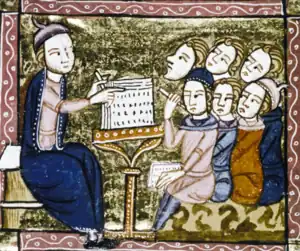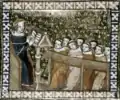

William of Nottingham, OFM (Latin: Guilelmus de Nottingham or Nothingham; d. 1330 x 1336) was an English Franciscan friar who served as the seventeenth Minister Provincial of England (c. 1316–1330).
Life
From 1312 to 1314, William served as the 39th reader (Latin: lector) at the Franciscan college at Oxford.[5] He later succeeded Richard of Conington, becoming the 17th Minister Provincial of England[6][n 1] (c. 1316–1330).[7] William attended the Franciscan General Chapter in 1322 and had royal permission to travel abroad in 1324 and 1325.[7] In 1330, he was ordered by Pope John XXII to extradict the friars Peter de Saxlingham, John de Hequinton, Henry de Costeseye, and Thomas de Helmedon. They were all arrested at Cambridge on charges of heresy.[8][9]
William died in Leicester sometime between 1330[10] and 1336[11] and was buried in the same Greyfriars cemetery that later held Richard III.[12] For a time, it was thought that his body may have been the one discovered in a double stone-and-lead coffin near Richard III's remains.[10][13] However, continued investigation established that tomb belonged to an as-yet-unknown elderly woman.[14]
He was succeeded as Minister Provincial by Roger of Denemed.[6]
Works
William was the actual author of the Commentary on the Gospels[15] that was formerly attributed to the earlier William of Nottingham.[n 2] Based on Clement of Llanthony's One from Four, the postill was well known for centuries and survives in numerous manuscripts.[16][17]
His Sentences (Latin: Sententiae) survives in a single copy and preserves various statements made by John Duns Scotus and his classmates while at Oxford, where they immediately preceded William.[18] One section thoroughly and temperately covers the scholastic opinions on the eternity of the world prior to the 1316 disputation, reaching the conservative conclusion that nothing truly infinite exists within God's Creation.[19]
In his capacity as the Franciscan lector at Oxford, he was responsible for copying five large volumes of postills[20] for Sir Hugh of Nottingham, who was a clerk at the Royal Exchequer.[21][7]
Notes
Gallery
References
Citations
- ↑ MS Laud Misc. 165, fol. 149.
- ↑ Szittya, Penn R. (14 July 2014), The Antifraternal Tradition in Medieval Literature, p. 68, ISBN 9781400854165.
- ↑ MS Laud Misc. 165, fol. 109.
- ↑ MS Laud Misc. 165, fol. 211.
- ↑ Dales (1990), p. 199.
- 1 2 3 Cuthbert (1903), pp. 242–243.
- 1 2 3 4 Smalley (1981), p. 252.
- ↑ Bliss (1895), p. 493.
- ↑ Salzman (1948).
- 1 2 "Mystery Deepens in Coffin-within-a-Coffin Found at Richard III Site", Heritage Daily, 29 July 2013, retrieved 31 October 2015.
- ↑ Bale cited by Smalley.[7]
- ↑ Henley, J. (29 July 2013), "Who Else is Buried in Richard III's Leicester Car Park Cemetery?", Guardian.
- ↑ Hoang, Li-mei (29 July 2013), "Mysterious Double Coffin Found at King Richard III Car Park Site", Reuters Online, Thomas Reuters.
- ↑ "University of Leicester Archaeologists Open the Mysterious Lead Coffin Found Buried Just Feet from the Former Grave of King Richard III", Press Releases, University of Leicester Press Office, 2 March 2015.
- 1 2 Smalley (1981), p. 287.
- 1 2 3 Little (1895).
- ↑ Including Royal MS 4 E II, Laud. Misc. 165, and Merton MSS 156 & 157.[16]
- ↑ Dumont (1994), p. 65.
- ↑ Dales (1990), p. 228.
- ↑ Oxford Merton MSS 166 and 168–171.
- ↑ Parkes (2008), p. 26
- ↑ MS Laud Misc. 165, fol. 268.
- ↑ MS Laud Misc. 165, fol. 298.
- ↑ MS Laud Misc. 165, fol. 356.
- ↑ MS Laud Misc. 165, fol. 393.
- ↑ MS Laud Misc. 165, fol. 467.
- ↑ MS Laud Misc. 165, fol. 509.
Bibliography
- Bliss, W.H., ed. (1895), Calendar of Entries in the Papal Registers relating to Great Britain and Ireland: Papal Letters, Vol. II A.D. 1305–1342, London: Eyre & Spottiswoode for Her Majesty's Stationery Office.
- Dales, Richard C. (1990), Medieval Discussions of the Eternity of the World, Leiden: E.J. Brill, ISBN 90-04-09215-3.
- Dumont, Stephen D. (1994), "William of Ware, Richard of Conington, and the Collationes Oxonienses of John Duns Scotus", John Duns Scotus: Metaphysics and Ethics: Proceedings of a Conference Held March 14–18, 1994, at the University of Bonn, Studien und Texte zur Geistegeschichte des Mittelalters, No. 53, Leiden: published in 1996 by E.J. Brill, pp. 59–86, ISBN 90-04-10357-0.
- Little, Andrew George (1895), "William of Nottingham", Dictionary of National Biography, Vol. XLI, London: Smith, Elder, & Co.
- Parkes, Malcolm Beckwith (2008), Their Hands Before Our Eyes: A Closer Look at Scribes, The Lyell Lectures, 1999, Ashgate Publishing, ISBN 978-0-7546-6337-9.
- Salzman, L.F., ed. (1948), "Franciscans, Cambridge", A History of the County of Cambridge and the Isle of Ely, Vol. II, London: Victoria County History, pp. 276–282.
- Smalley, Beryl (1981), "Which William of Nottingham?", Studies in Medieval Thought and Learning: From Abelard to Wyclif, History, No. 6, London: Antony Rowe for the Hambledon Press, pp. 249–288, ISBN 0-9506882-6-6.
- Thomas of Eccleston (1903), Fr. Cuthbert (ed.), The Friars and How They Came to England, being a Translation of Thomas Eccleston's "De Adventu F.F. Minorum in Angliam" Done into English with an Introductory Essay on the Spirit and Genius of the Franciscan Friars, London: Sands & Co.
External links
 Media related to William of Nottingham II at Wikimedia Commons
Media related to William of Nottingham II at Wikimedia Commons






